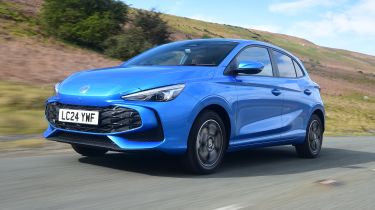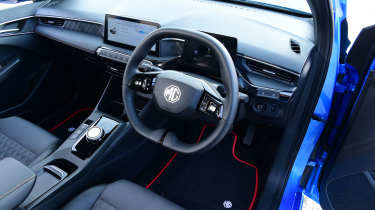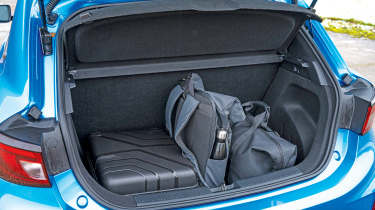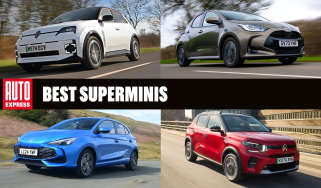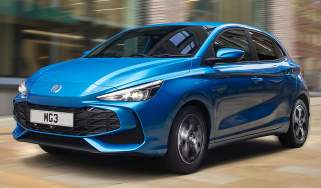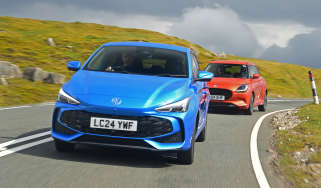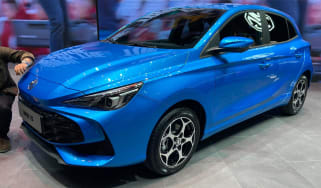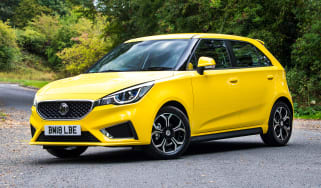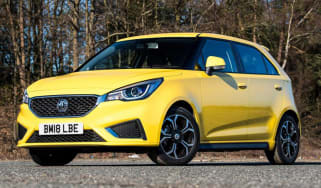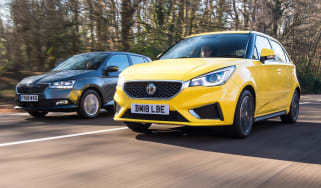MG3 review
The wide range of talents revealed in our road tests and the competitive pricing of the MG3 make it more than a match for its rivals

Our opinion on the MG3
The MG3 has won our Affordable Hybrid Car of the Year award twice now, but there’s a lot more to like about this budget-friendly supermini than the price.
It’s surprisingly fun to drive, yet balances this out with a compliant ride and strong refinement. Similarly, the hybrid version delivers a level of performance that blows its rivals away, but is still frugal and easy to drive around town. Equipment levels are strong and even the interior quality is impressive for such an affordable car.
While I do think there are one or two small areas that could be improved, they’re very easy to forgive when the MG3 is significantly cheaper than any of its closest competitors.
About the MG3
When it was launched in 2007, the original MG3 wasn’t all that competitive in the small car arena. Yes, it was very cheap, and it even handled quite well, but in every other respect, it fell well short of the standards expected to compete with the best in the supermini class.
It took nearly two decades for an all-new replacement to arrive, but I think it was well worth the wait. The five-door supermini gained a vast injection of tech and equipment, including a sophisticated full-hybrid powertrain that gives the MG3 class-leading performance and fuel economy – at least on paper.
Used - available now
Myself and the Auto Express team have tested the MG3 extensively, including a head-to-head test against one of its key rivals, the Suzuki Swift, last year where the MG came out on top. I personally covered nearly 3,200 miles in an MG3 Hybrid+ that was part of our fleet of long-term test cars.
MG MG3 prices and latest deals
How much does the MG MG3 cost? Well, official ‘on the road’ prices range from £16,975 to £21,060 but you can currently save an average of £2,805 through the Auto Express Find A Car service, where prices start at £15,126. You can lease a MG MG3 from £254 per month or buy a used model at prices starting from £13,750.
Check out our latest new car deals, leasing deals and used car deals for the top offers available now on Auto Express. And don't forget we can help you sell your car, too.
Engines, performance & drive
|
Pros |
|
|
Cons |
|
The base, pure-petrol MG3 gets a 1.5-litre four-cylinder engine with a five-speed manual gearbox. Very simple, very demure. I’ve not had a chance to drive this particular model yet, but I lived with the MG3 Hybrid+ for several months and was largely impressed by its hybrid powertrain. It uses the same four-cylinder engine, but paired with an electric motor and a three-speed automatic gearbox.
| Model | Power | 0-62mph | Top speed |
| MG3 petrol | 148bhp | 10.8 s | 115mph |
| MG3 Hybrid+ | 192bhp | 8.0 s | 106mph |
0-62mph acceleration and top speed
What sets the hybrid system in MG3 apart from those in its rivals, such as the Renault Clio and Toyota Yaris, is how much more involved the electric motor is. Rather than lending the petrol a hand now and again, it’s the headline act in the MG3.
The result is the MG3 Hybrid+ behaves more like an EV, accelerating off the mark with the similarly instantaneous response of a fully electric car, with the equivalent Toyota and Renault feeling much less powerful and lethargic off the mark. It’s ideal when you’re driving around town at low speeds, however, the powertrain’s flaws quickly show when you try to get up to motorway speeds.
I found while living with the MG3 Hybrid that after the e-motor has delivered its hit of torque and the petrol engine has to take the reins, you have to wait for the dimwitted three-speed transmission to wake up and realise it needs to shift down, before you start gaining speed again.
What’s more, the gearbox only tends to shift into top gear when you approach 70mph. That’s fine when you’re joining a motorway, but means on a 60mph country road you’re forced to listen to the drone of the engine until you either speed up or the three-speed transmission gets its act together.
Town driving, visibility and parking
Visibility is reasonable but could be better, partly because of the sloping rear windscreen and dashboard design. The driver’s seat has a decent range of adjustment, but you can’t change the reach for the steering wheel, which makes it harder for all body types to get comfortable.
The throttle can be hard to modulate at very low speeds, too, meaning parking manoeuvres tend to be slightly jerky. At least in Trophy trim, the MG3 comes with a clear 360-degree parking camera system that is a big help if you find yourself in a tight situation, such as a multi-storey car park, for instance.
Country road driving and handling
The MG3 rides fairly well on UK roads, smoothing out the imperfections on pockmarked roads, thanks in no small part to its small 16-inch wheels and large profile tyres. But at the same time, body roll isn’t too excessive. As with an electric car, the MG3 Hybrid+ has three levels of regenerative braking, which you quickly toggle between using a button on the steering wheel, and this smoothly slows the car down. The light steering can feel a little unnatural due to its slightly odd weighting, especially in Sport mode.
Motorway driving and long-distance comfort
Quite a bit of road noise makes its way into the MG3’s cabin at higher speeds, but it does feel stable on a motorway. The adaptive cruise control that comes as standard is great on longer journeys, too. We’ve criticised MGs in the past for their overly intrusive driver aids, but things have improved dramatically on this current model. On narrow roads, it’s far less likely to tug at the wheel when it thinks you’re about to cross a white line, making it much less irritating.
“I wish turning off the MG3’s various safety and driver-assistance systems was easier, because it all has to be done via the touchscreen. The worst of all is the deafeningly loud speed-camera warning that you’ll want to turn off as possible.” - Ellis Hyde, news reporter.
MPG, emissions & running costs
|
Pros |
|
|
Cons |
|
While the MG3 Hybrid+ can supposedly return up to 64.2mpg, I couldn’t get close to that figure during the months I lived with it. After 3,200 miles, the trip computer said I had averaged 50.4mpg.
Most people would be satisfied by that, but my colleague Tom Jervis managed to achieve nearly 57mpg when he lived with the rival Suzuki Swift. Plus, when the hybrid-powered Renault Clio and Toyota Yaris faced off in an Auto Express twin test, they averaged 56.2 and 58.5mpg, respectively.
You should be able to get better fuel economy if you spend more of your time driving around town. Here the electric motor can work at its most efficient and you take advantage of the MG3 having a bigger battery than most rivals. That means you can spend more time driving around on electric power.
MG says the pure-petrol model will return up to 46.3mpg at best – nearly 20mpg less than the Hybrid+ can manage on paper – but it also costs £2,000 less to buy than the electrified version.
| Model | MPG | CO2 | Insurance Group |
| MG3 petrol | 46.3mpg | 137g/km | 16 |
| MG3 Hybrid+ | 64.2mpg | 100g/km | 23-24 |
Insurance groups
The MG3 hybrid is several insurance groups higher than its competitors, which will likely lead to pricier premiums. For instance, while the Hybrid+ SE model falls into group 23, the equivalent Clio E-Tech is in group 15.
Tax
Both SE and Trophy trims of the hybrid MG3 put out 100g/km, which is significantly lower than a traditional petrol-powered supermini. It’s not quite as low as the sub-100 g/km figures produced by either the Clio E-Tech or Yaris hybrid, which means those two have slightly lower Benefit-in-Kind (BiK) company-car tax rates. None will match a full EV, such as the Peugeot E-208 or Vauxhall Corsa Electric, for BiK tax, though.
Depreciation
According to our latest expert data, the MG3 should hold onto up to 55 per cent of its original value over a typical three-year/36,000-mile ownership period, with the Hybrid+ models being the best performers. The Clio E-Tech hybrid is expected to return between 50 and 53 per cent, depending on trim level – but of course, it also starts from around £2,500 more than the MG3 in SE trim.
To get an accurate valuation on a specific model check out our free car valuation tool...
Design, interior & technology
|
Pros |
|
|
Cons |
|
We appreciate that style is subjective, but aside from the sea creature-like mouth this car has, it looks a little plain and already a bit dated compared with its much more sharply-dressed rivals, such as the Renault Clio and Peugeot 208. Part of that is down to its small 16-inch wheels, although the trade-off they bring in ride comfort seems worthwhile.
It might be not the most exciting supermini to look at, but every MG3 comes generously equipped with all this:
- 10.25-inch touchscreen
- 7.0-inch digital driver display
- Apple CarPlay and Android Auto
- Built-in sat-nav
- Adaptive cruise control
- Lane-keep assist
- Driver attention alert
- Reversing camera and parking sensors
Upgrade to Trophy trim - which is only available on the MG3 Hybrid+ - and you also get:
- 360-degree parking camera
- Keyless entry
- Heated front seats
- Heated steering wheel
- LED headlights
- Blind-spot detection
Interior and dashboard design
As with all of MG’s latest models, the interior of the MG3 looks simple, smart and modern. It feels spacious up front, too, thanks in part to the low centre console, and there are some nice touches, such as the quilted upholstery and check pattern on the dash. That said, the cabins of most, if not all, of this car’s rivals look and feel better.
Materials and build quality
Cabin fit and finish hasn’t always been the first reason you’d buy an MG over its rivals, and here, the MG3 is decent but not class-leading. While there are some squidgy materials in the places you frequently touch, such as the armrests and the steering wheel, there is plenty of hard plastic elsewhere. This isn’t that unusual in this class, but a Renault Clio or a Peugeot 208 feel much posher inside. There are some very cheap areas, such as the flimsy sliding tray beneath the front centre armrest.
Sat-nav, stereo and infotainment
Every MG3 gets a bright 10.25-inch screen. It’s fairly responsive and loading times are fine, but most people will end up bypassing the system by using the Apple CarPlay and Android Auto smartphone connectivity. The audio system gets the job done, but the sound quality is a little weak compared with the class best, and lacks clarity when it comes to voices on podcasts or phone calls. Plus there’s no option to upgrade to a fancier set-up.
Much like its MG4 sibling, you can set up a shortcut from the steering wheel that lets you adjust the climate controls using the touch pads on the right side of the wheel.
“While I think the interior of the MG3 is a nicer place to be than the Suzuki Swift’s, that’s not really saying much. Yes, the Renault Clio or Skoda Fabia cost more, but their plusher cabins and more intuitive tech lets you see and feel where that money has gone.” - Ellis Hyde, news reporter.
Boot space, comfort & practicality
|
Pros |
|
|
Cons |
|
The MG3 doesn’t boast class-leading amount of space, but is on par with rivals and what people will be expecting from a modern supermini. Similarly, while there aren’t any clever storage solutions, the tray in the centre console can accommodate the largest smartphones around, and the door bins are large enough for an average-sized water bottle.
Dimensions and size
At 4,113mm long, the MG3 is slightly longer than the class average, although much of that seems to come from its protruding bonnet, rather than being put to best use for passenger space.
| Model | MG3 | Renault Clio | Vauxhall Corsa |
| Length | 4,113mm | 4,053mm | 4,060mm |
| Width | 1,797mm | 1,7798mm | 1,765mm |
| Height | 1,502mm | 1,440mm | 1,435mm |
| Wheelbase | 2,570mm | 2,583mm | 2,538mm |
| Boot space | 293 litres | 301-391 litres | 309 litres |
Seats & passenger space
The Skoda Fabia is better if you often carry adults in the back, because the MG3’s headroom is a little tighter than the very best in this segment. The seats themselves are comfortable, though, and there’s plenty of foot space under the front seats, plus a flat floor.
Boot space
Whether you go for the petrol or hybrid model, the MG3 has a 293-litre boot that’s only slightly smaller than the Vauxhall Corsa and Clio E-Tech’s. However, the non-hybrid Renault Clio and Skoda Fabia offer considerably more space.
There’s a large load lip because of how deep the boot is, but I didn’t find this to be an issue when I lived with the MG3, nor was the lack of a height-adjustable boot floor. But the MG3 not having split-folding rear seats like most rivals (they’re one piece) does limit its versatility.
Safety & reliability
|
Pros |
|
|
Cons |
|
Industry safety experts Euro NCAP tested the new MG3 in 2025, and released a scathing report that recommended buyers actually avoid this car after an unprecedented fault emerged during evaluation.
Testers noted that during its 31mph frontal offset crash test, the MG3’s seat latch failed, which led to a seat twist on impact. This seat latch mechanism failure led to extra impact on the driver dummy’s right leg, while also making its head ‘bottom out’ against the steering wheel rather than the airbag.
As a result, Euro NCAP labelled head protection in the MG3 as ‘adequate’ and leg protection as ‘poor’. Euro NCAP said that since it began crash testing in 1997, this type of failure had “not been seen before”. In response to the test results, MG said it would be implementing changes to the driver’s seat latching mechanism.
Despite all that, Euro NCAP still awarded the MG3 a solid four-star crash safety score. For context, the Suzuki Swift only got three stars, while the Renault Clio and Skoda Fabia both received the maximum five-star ratings.
Plenty of safety features come as standard, such as cruise control, a driver-attention monitoring system and lane-keep assistance. The top-of-the-range Trophy trim adds a blind-spot monitoring system to warn you of vehicles alongside you when you indicate to change lanes on a motorway.
MG hasn’t fared well as a brand in our Driver Power customer satisfaction surveys for several years. The brand finished dead last once again in our best car manufacturers category, and only one of its models made it onto our list of the top-50 best cars to own. That was the Mk1 MG HS, which is no longer on sale.
| Euro NCAP safety ratings | |
| Euro NCAP safety rating | 4/5 stars (2025) |
| Adult occupant protection | 74% |
| Child occupant protection | 73% |
| Vulnerable road user protection | 81% |
| Safety assist | 69% |
Buying and owning
Best buy: MG3 Hybrid+ Trophy
It’s not often we recommend the top-of-the-range version of a car, but the MG3 Hybrid Trophy+ costs £21,245 which is a few hundred pounds cheaper than an entry-level Clio E-Tech. For that you get the impressive hybrid powertrain we’ve spoken about, and all the kit MG will throw at this car, including LED headlights, a 360-degree parking camera, heated front seats, heated steering wheel, leather-effect upholstery, keyless entry and blind-spot detection.
MG3 alternatives
There’s no shortage of rivals for the MG3, especially now it’s available with a choice of pure-petrol and hybrid power. The closest competitors are the multiple award-winning Renault Clio and Citroen C3, which are two of our favourite superminis and offered with a similar choice of drivetrains. The Skoda Fabia is also a very talented alternative, as is the Toyota Yaris, which is only available as a hybrid. The Suzuki Swift continues to offer plenty of value, but feels even cheaper than the MG, despite starting from close to £20k now.
Latest deals on MG3 and alternatives
Frequently Asked Questions
The MG3 is among the most fun to drive, comfortable and best-equipped cars in its class. It’s also easily the fastest, while returning strong fuel consumption figures. That it achieves all of this while vastly undercutting pretty much every other rival on price makes it a proper supermini star.
